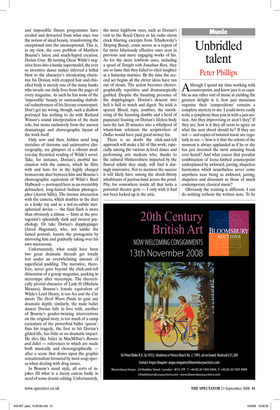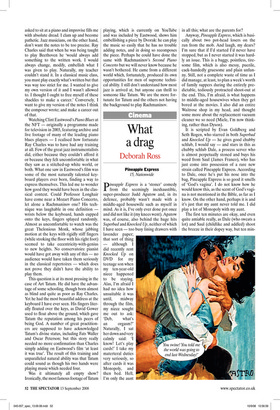Unbridled talent
Peter Phillips
Although I spend my time working with counterpoint, and know jazz is as capable as any other sort of music at yielding the greatest delight in it, how jazz musicians organise their ‘compositions’ remains a complete mystery to me. I could more easily write a symphony than join in with a jam session. Are they improvising or aren’t they? If they are, how is it they all seem to agree on what the next chord should be? If they are not — and copies of notated music are regularly in use — how is it that the soloist of the moment is always applauded as if he or she has just invented the most amazing break ever heard? And what causes that peculiar combination of loose-limbed counterpoint underpinned by awkward, jarring, shapeless harmonies which nonetheless never come anywhere near being as awkward, jarring, shapeless and dissonant as those of much contemporary classical music?
Obviously the training is different. I can do nothing without the written note. To be asked to sit at a piano and improvise fills me with absolute dread. I clam up and become pathetic. Jazz musicians, on the other hand, don’t want the notes to be too precise. Ray Charles said that when he was being taught to play Beethoven he ‘would always add something to the written work. I would always change, modify, embellish what I was given to play. Naturally, my teacher couldn’t stand it. In a classical music class, you must play exactly what’s written but that was way too strict for me. I wanted to give my own version of it and I wasn’t allowed to. I thought I ought to free myself of these shackles to make a career.’ Conversely, I want to give my version of the notes I think the composer wrote; and make a career out of that.
Watching Clint Eastwood’s Piano Blues at the NFT — originally a programme made for television in 2003, featuring archive and live footage of many of the leading piano blues players — I realised how fortunate Ray Charles was to have had any training at all. Few of the great jazz instrumentalists did, either because they couldn’t afford it or because they felt uncomfortable in what they saw as a stitched-up white world, or both. What one saw in Eastwood’s film was some of the most naturally talented keyboard players ever born, finding a way to express themselves. This led me to wonder how good they would have been in the classical context. Could Professor Longhair have come near a Mozart Piano Concerto, let alone a Rachmaninov one? His technique was laughable in one definition — wrists below the keyboard, hands cupped onto the keys, fingers splayed randomly. Almost as uncomfortable to watch was the great Thelonious Monk, whose jabbing motion at the keys with rigidly stiff fingers (while stroking the floor with his right foot) seemed to take eccentricity-with-genius to new heights. No conservatoire pianist would have got away with any of this — no audience would have taken them seriously in the classical repertoires — which does not prove they didn’t have the ability to play them.
This question is at its most pressing in the case of Art Tatum. He did have the advantage of some schooling, though born almost as blind and quite as poor as Ray Charles. Yet he had the most beautiful address at the keyboard I have ever seen. His fingers literally floated over the keys, as David Gower used to float above the ground, which gave Tatum the reputation among his peers of being God. A number of great practitioners are supposed to have acknowledged Tatum’s divine status, including Fats Waller and Oscar Peterson; but this story really needed no more confirmation than Charles simply adding on Eastwood’s film ‘at least it was true’. The result of this training and unparalleled natural ability was that Tatum could sound as though his two hands were playing music which needed four.
Was it ultimately all empty show? Ironically, the most famous footage of Tatum playing, which is currently on YouTube and was included by Eastwood, shows him embellishing a piece by Dvorak: he can play the music so easily that he has no trouble adding notes, and in doing so recomposes the piece. Perhaps he could have done the same with Rachmaninov’s Second Piano Concerto but we will never know because he wasn’t bothered. He came from a different world which, fortunately, produced its own opportunities for men of supreme technical ability. I still don’t understand how most jazz is arrived at, but anyone can thrill to someone like Tatum. We are the more fortunate for Tatum and the others not having the background to play Rachmaninov.











































































 Previous page
Previous page